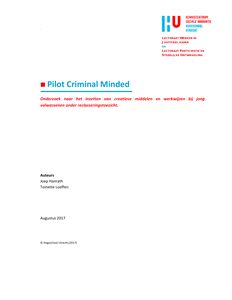Kernwerkzaamheden van de reclassering zijn advies, toezicht, werkstraf, gedragsinterventies en toe leiden naar zorg. Doel is het verminderen van recidive en het bevorderen van inclusie en maatschappelijke participatie. De reclassering krijgt sinds enige tijd meer ruimte om persoons-gericht maatwerk te leveren en toe te leiden naar innovatieve werkwijzen en projecten (Bosker & Lünnemann, 2016). Onder de noemer Ruim Baan voor Betekenisvol Maatwerken wordt gezocht naar een andere manier van werken met burgers die zijn aangehouden voor een delict, waar ernstige sociale problematiek onder schuil gaat. Reclasseringswerkers worden gestimuleerd om out of the box te denken, aansluiting te vinden bij het sociale domein en context- en herstelgericht te werken. In dit onderzoek wordt een nieuw initiatief onder de loep genomen: Criminal Minded. Een cursus bestaande uit acht workshops, vier individuele contacten en een gezamenlijke afsluiting. Met creatieve werkwijzen en middelen als storytelling, rap, spoken word, poëzie, dans en geïnspireerd door ervaringsdeskundigen, rolmodellen, artiesten en ondernemers worden de deelnemers met reclasseringstoezicht geholpen in de zoektocht naar een nieuwe baan of stageplek. De onderzoeksvraag was: biedt de cursus Criminal Minded aan jong volwassenen met reclasseringstoezicht de mogelijkheid om, middels creatieve middelen, hun sterke punten in kaart te laten brengen en hen aan te laten haken bij opleiding, werk of ander levensdoel? Met een participatief onderzoek is beschrijvend en met visuele middelen in kaart gebracht wie aan de cursus hebben deelgenomen, wat er gedurende workshops is gedaan en wat dit de deelnemers heeft opgeleverd.
DOCUMENT

In this article, the author will question the seemingly obvious boundary between civil disobedience, as conceptualised by Rawls and Arendt, and several examples of criminal, or simply annoying, activities which don't meet their criteria, such as the case of the ‘Top 50'. The ‘Top 50' are multi-problem Dutch-Caribbean men, who refuse to adapt to predominant norms in Dutch society. IThe author argues that political aspects of their behaviour should be acknowledged, even if they engage in criminal behaviour and don't present explicit political goals. Firstly, she questions the way in which Rawls based his definition on a centralistic conception of governmental power and contrast it with Foucault's conception of normalising power, in which power is diffuse and cannot be restricted to the enactment of formal laws. Secondly, she discusses what the minimum requirements are to be able to classifyacts as civil disobedience. Rawls and Arendt draw a clear line between criminal behaviour and civil disobedience, but their requirements may be too strict. We might miss signals of injustice if actions that do not meet these criteria are excluded from the political discourse. The conclusion is that comparing Arendt's and Rawls' conception of civil disobedience with the behaviour of a marginal migrant group may be useful in questioning the boundaries of this concept and in making it more inclusive. A wider conception of civil disobedience may help to explain the meaning of deviant behaviour in terms of social critique and to challenge the traditional understanding of civil disobedience.
DOCUMENT

ENGLISH: A vast and growing body of research has shown that crime tends to run in families. However, previous studies focused only on traditional crimes and research on familial risk factors for cyber offending is very scarce. To address this gap in the literature, the present study examines the criminal behavior of the family members of a sample of cyber offenders prosecuted in the Netherlands. The sample consists of 979 cyber offenders prosecuted for computer trespassing between 2001 and 2018, and two matched groups of 979 traditional offenders and 979 non-offenders. Judicial information and kinship data from Dutch Statistics were used to measure criminal behavior among family members. Both traditional offenders and cyber offenders were found to be more likely to have criminal fathers, mothers, and siblings than non-offenders. Additional analyses, however, showed different patterns between cyber offenders who were only prosecuted for cyber offenses and those who also committed traditional crimes. While the former group of cyber offenders were similar to non-offenders in terms of family offending, the latter group of cyber offenders were more similar to traditional offenders. Overall, these results suggest that the traditional mechanisms of intergenerational transmission of crime can only partially explain cybercrime involvement. NEDERLANDS: Uit een groot en groeiend aantal onderzoeken blijkt dat criminaliteit vaak in families voorkomt. Eerdere studies richtten zich echter alleen op traditionele misdrijven en onderzoek naar familiaire risicofactoren voor cybercriminaliteit is zeer schaars. Om deze leemte in de literatuur op te vullen, onderzoekt deze studie het criminele gedrag van familieleden van een steekproef van cyberdelinquenten die in Nederland worden vervolgd. De steekproef bestaat uit 979 cyberdelinquenten die tussen 2001 en 2018 zijn vervolgd voor computervredebreuk, en twee gematchte groepen van 979 traditionele delinquenten en 979 niet-delinquenten. Justitiële informatie en verwantschapsgegevens van het Centraal Bureau voor de Statistiek werden gebruikt om crimineel gedrag onder familieleden te meten. Zowel traditionele daders als cybercriminelen bleken vaker criminele vaders, moeders en broers en zussen te hebben dan niet-daders. Aanvullende analyses lieten echter verschillende patronen zien tussen cyberdelinquenten die alleen werden vervolgd voor cyberdelicten en degenen die ook traditionele delicten pleegden. Terwijl de eerste groep cyberdelinquenten vergelijkbaar was met niet-delinquenten wat betreft gezinsdelinquentie, leek de tweede groep cyberdelinquenten meer op traditionele delinquenten. In het algemeen suggereren deze resultaten dat de traditionele mechanismen van intergenerationele overdracht van criminaliteit de betrokkenheid bij cybercriminaliteit slechts gedeeltelijk kunnen verklaren.
DOCUMENT
